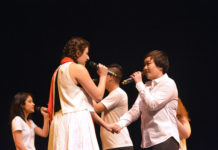Members of the KW Turkish and Syrian communities gathered at a vigil held on March 14 for the Türkiye-Syria earthquakes. Organizer Nisan Aydin, a Turkish UW student, said that the vigil was meant to “give people the space to share their story and…grieve together, because we have a very community-focused culture.”
Aydin stated that they organized the vigil to allow communities to share personal stories, gather communal support, express remembrance, and discuss the challenges Türkiye and Syria are facing in the aftermath of the February earthquakes. The vigil was led by Aydin in partnership with Racial Advocacy for Inclusion, Solidarity and Equity (RAISE).
On Feb. 6 at 4:17 a.m., a 7.8 magnitude earthquake struck southern and central Türkiye and northern and western Syria. Less than 12 hours later, a 7.6 magnitude tremor hit the same region. Aftershocks of 6.4 and 5.6 magnitudes continued over the next few days, attracting the world’s attention.
The vigil opened with a slideshow of photographs from Türkiye and Syria, showing collapsed buildings, civilians rescuing people trapped under the rubble, the searches for missing family and friends, rescuers carrying children out, and camps for those displaced. Upwards of 41,000 people in Türkiye and 5,800 in Syria have died.
Several speakers shared thoughts, resources, and stories at the vigil. Among a crowd of students, the event was also attended by Inci Kuzucuoglu, president of the KW Turkish Cultural Association, Sahver Kuzucuoglu, UW Religion and Culture lecturer, counsellors from UW and WLU, as well as members of Eye Movement Desensitization and Reprocessing (EDMR) psychotherapy KW.
During her speech, WLU student Lydia Gosken shared the words “Dogdugun yer kaderindir” — a Turkish saying meaning “the place you’re born in is your destiny.”
“When I see images of the epicentre of the earthquake, I see people I grew up around and places I once walked in. I see the places left to dust, there’s nothing left of…the place that ties me to my country,” she said.
The shock of the earthquake and feelings of immense loss were shared by the other speakers, as were resilience, perseverance, and the need for community support.
“Community is something that is a very basic human need. If water and shelter and food are basic needs so are community and love and belonging. That is something that has come to show us we are not alone. You are not alone,” Sahver Kuzucuoglu said.
She expressed how the events connected her with Syrian student Haifaa Alzahhal, who spoke about how grief has affected her family since fleeing Syria during the civil war that began in 2011. “Our mourning was disrupted by the constant fear and worry about the people we left behind. The earthquake that struck North Syria and Turkiye only made matters worse, there’s no room for grieving because of the scarcity of resources for those in Syria and the survivors’ guilt for those living elsewhere.” Alzahhal said. “It is time to start properly healing as a community and end the cycle of pushing the mourning and grieving process aside. Tragedy doesn’t care who it strikes, we are lucky to have such a support system [here] to help each other heal.”
Mental health was emphasized, with regional counseling services offering support for anyone who wants to talk about how they have been affected. “Every time I talk about it, it gets harder to talk about it. I wanted for it to be able to create a place and a space for people to share their stories,” Aydin said. During the vigil, EDMR KW led the group through a bilateral stimulation tapping exercise to aid the healing process.
Aydin reached out to WUSA clubs the day after the earthquakes to try and organize an event in response to the disaster. “I thought that I would have a unique perspective because I’ve had the experience of advocating for these issues and being [an] activist in the community, as well as being somebody who is in the community that was affected… I felt like it was my job as somebody who had that background, and experience, and understanding, and perspective that I had to help [bring] people together.”
Aydin said they are also planning a fundraiser in partnership with the UW Acapella Club (UWAC). The fundraiser will take place March 27 from 6-8 p.m. in the SLC Black and Gold room, and will involve a concert as well as a bake sale and a silent auction.
Aydin described several positive one-on-one interactions with attendees. “I had a friend from high school come up to me…she said that she had really benefited from [the event] and hearing other people talk about their experience. She felt less alone.” Aydin also described a conversation with a Pakistani student who expressed solidarity with the Turkish and Syrian communities, and an appreciation of the new perspective gained from the vigil.
“That was kind of my goal. I wanted people to feel like we’re not alone… Even impacting one person in that way was really beautiful,” Aydin said.
Aydin said they hope to continue the advocacy work with other Turkish community members, and had opened an Instagram account, @kw_tr_sy_earthquake_support, for this purpose. They also hoped to host larger events in future, in venues such as Federation Hall, to raise more funds. The charity that the funds will be sent to is to be determined.
When reflecting on their advocacy work, Aydin expressed a deep motivation to continue.
“Yes, I’m a student. Yes, I’m busy, but I don’t mind doing this because it really sparks that fire in me and that want to help. That’s really important to me, that keeps me going.”





























